- Home
- Gerald Durrell
Menagerie Manor Page 11
Menagerie Manor Read online
Page 11
Knowing all this, I viewed with mixed feelings the clutch of a dozen eggs which the female Fernand’s skink laid one morning in the earth at the bottom of her cage. They were white, oval eggs, each about the size of a sugared almond, and the female (as happens among some of the skinks) stood guard over them and would attack your hand quite fearlessly should you put it near the eggs. With most lizards the female walks off, having laid her batch, and forgets all about it; in the case of some of the skinks, however, the female guards the nest and, lying on top of the soil in which the eggs are buried, urinates over the nest at intervals to maintain the right moisture content, in order to keep the delicate shells from shrivelling up in the heat. Our female skink appeared to know what she was doing, and so all we could do was to sit back and await developments, without any great hope that the eggs would hatch. As week after week passed, our hopes sank lower and lower, until, eventually, I dug down to the nest, expecting to find every egg shrivelled up. To my surprise, however, I found that only four eggs had done so; the rest were still plump and soft, though discoloured, of course. I removed the four shrivelled ones and carefully opened one with a scalpel. I found a dead but well-developed embryo. This was encouraging, for it proved at least that the eggs were fertile. So we sat back to wait again.
Then, one morning, I was down in the Reptile House about some matter, and as I passed the skink’s cage, I happened to glance inside. As usual, the cage looked empty, as the parent skinks spent a lot of their time buried in the soil at the bottom of the cage. I was just about to turn away when a movement among the dry leaves and moss attracted my attention. I peered more closely to see what had caused it, and suddenly, from around the edge of a large leaf, I saw a minute pink and black head peering at me. I could hardly believe my eyes, and stood stock still and stared as this tiny replica of the parents slowly crept out from behind the leaf. It was about an inch and a half long, with all the rich colouring of the adult, but so slender, fragile and glossy that it resembled one of those ornamental brooches that women wear on the lapels of their coats. I decided that if one had hatched, there might be others, and I wanted to remove them as quickly as possible for, although the female had been an exemplary mother till now, it was quite possible that either she or the male might eat the youngsters.
We prepared a small aquarium and very carefully caught the baby skink and put him into it. Then we set to work and stripped the skink’s cage. This was a prolonged job, for each leaf, each piece of wood, each tuft of grass had to be checked and double checked, to make sure there was no baby skink curled up in it. When the last leaf had been examined, we had four baby Fernand’s skinks running around in the aquarium. When you consider the chances of any of the eggs hatching at all, to have four out of 12 was, I thought, no mean feat. The only thing that marred our delight at this event was that the baby skinks had decided to hatch at the beginning of the winter, and as they could only feed off minute things the job of finding them enough food was going to be difficult. Tiny mealworms were, of course, our standby, but all our friends with gardens rallied round, and would come up to the Zoo once or twice a week, bearing biscuit-tins fall of wood-lice, earwigs, tiny snails and other dainty morsels that gave the babies the so necessary variety in diet. Thus the tiny reptiles thrived and grew. At the time of writing, they are about six inches long, and as handsome as their parents. I hope it will not be long before they start laying eggs, so that we can try to rear a second generation in captivity.
There are, of course, some animals which could only with the greatest difficulty be prevented from breeding in captivity, and among these are the coatimundis. These little South American animals are about the size of a small dog, with long, ringed tails which they generally carry pointing straight up in the air. They have short, rather bowed legs, which give them a bear-like, rolling gait; and long, rubbery, tip-tilted noses which are forever whiffling to and fro, investigating every nook and cranny in search of food. They come in two colours: a brindled greenish-brown, and a rich chestnut. Martha and Mathias, the pair I had brought back from Argentina, were of the brindled kind.
As soon as these two had settled down in their new cage in the Zoo they started to breed with great enthusiasm. We noticed some very interesting facts about this which are worth recording. Normally, Mathias was the dominant one. It was he who went round the cage periodically ‘marking’ with his scent gland so that everyone would know it was his territory. He led Martha rather a dog’s life, pinching all the best bits of food until we were forced to feed them separately. This Victorian male attitude was only apparent when Martha was not pregnant. As soon as she had conceived, the tables were turned. She was now the dominant one, and made poor Mathias’s life hell, attacking him without provocation, driving him away from the food, and generally behaving in a very shrewish fashion. It was only by watching to see which was the dominant one at the moment, that we could tell, in the early stages, whether Martha was expecting a litter or not.
Martha’s first litter consisted of four babies, and she was very proud of them, and proved to be a very good mother indeed. We were not sure what Mathias’s reactions to the youngsters was going to be, so we had constructed a special shut-off for him, from which he could see and smell the babies without being able to sink his teeth into them, should he be so inclined. It turned out later that Mathias was just as full of pride in them as Martha, but in the early stages we were not taking any risks. Then the great day came when Martha considered the babies were old enough to be shown to the world, and so she led them out of her den and into the outside cage for a few hours a day. Baby coatimundis are, in many ways, the most enchanting of young animals. They appear to be all head and nose, high-domed, intellectual-looking foreheads, and noses that are, if anything, twice as rubbery and inquisitive as the adults’. Then they are natural clowns, forever tumbling about, or sitting on their bottoms in the most human fashion, their hands on their knees. All this, combined with their ridiculous rolling, flat-footed walk, made them quite irresistible. They would play follow-myleader up the branches in their cage, and when the leader had reached the highest point he would suddenly go into reverse, barging into the one behind, who, in his turn, was forced to back into the one behind him, and so on, until they were all descending the branch backwards, trilling and twittering to each other musically. Then they would climb up into the branches and do daring trapeze acts, hanging by their hind paws, or one fore paw, swinging to and fro, trying their best to knock each other off. Although they often fell from quite considerable heights on to the cement floor, they seemed as resilient as india-rubber and never hurt themselves.
When they grew a little older and discovered they could squeeze through the wire mesh of the cage, they would escape and play about just inside the barrier rail. Martha would keep an anxious eye on them during these excursions, and should any real or imaginary danger threaten they would come scampering back at her alarm cry, and, panting excitedly, squeeze their fat bodies through the wire mesh and into the safety of the cage. As they grew bolder, they took to playing farther and farther afield. If there were only a few visitors about, they would go and have wrestling matches on the main drive that sloped down past their cage. In many ways this was a nuisance, for at least twenty times a day some kindly and well-intentioned visitor would come panting up to us with the news that some of our animals were out, and we would have to explain the whole coatimundi set-up.
It was while the babies were playing on the back drive one day that they received a fright which had a salutary effect on them. They had gradually been going farther and farther away from the safety of their cage, and their mother had been growing increasingly anxious. The babies had just learnt how to somersault, and were in no mood to listen to their mother’s warnings. It was when they had reached a point quite far from their cage that Jeremy drove down the back drive in the Zoo van. Martha uttered her warning cry, and the babies, stopping their game, suddenly saw they were about to be attacked by an enormous roaring mons
ter that was between them and the safety of their home. Panic-stricken they turned and ran. They galloped flat-footedly down past the baboon cage, past the chimps’ cage, past the bear cage, without finding anywhere to hide from the monster that pursued them. Suddenly, they saw a haven of safety, and the four of them dived for it. The fact that the ladies’ lavatory happened to be empty at that moment was entirely fortuitous. Jeremy, cursing all coatimundis, crammed on his brakes and got out. He glanced round surreptitiously to make sure there were no female visitors around, and then dived into the ladies’ in pursuit of the babies. Inside, they were nowhere to be seen, and he was just beginning to wonder where on earth they had got to when muffled squeaks from inside one of the cubicles attracted him. He discovered that all four babies had squeezed under the door of one of these compartments. What annoyed Jeremy most of all, though, was that he had to put a penny in the door to get them out.
Still, whatever tribulations they might give you, the babies in the Zoo provide tremendous pleasure and satisfaction. The sight of the peccaries playing wild games of catch-as-catch-can with their tiny piglets; the baby coatimundis rolling and bouncing like a circus troupe; the baby skinks in their miniature world, carefully stalking an earwig almost as big as themselves; the baby marmosets dancing through the branches, like little gnomes, hotly pursued by their harassed father: all these things are awfully exciting. After all, there is no point in having a Zoo unless you breed the animals in it, for by breeding them you know that they have come to trust you, and that they are content.
CHAPTER SEVEN
A GORILLA IN THE GUEST-ROOM
Dear Mr Durrell,
Could you please have our Rhesus monkey? He is growing so big and jumping on us from trees and doing damage and causing so much trouble. Already my mother has been in bed with the doctor three times...
It was towards the end of the second year that I decided, the Zoo now being well established, it must cease just being a mere showplace of animals, and start to contribute something towards the conservation of wildlife. I felt that it would be essential to gradually weed out all the commoner animals in the collection and to replace them with rare and threatened species. That is, species which were threatened with extinction in the wild state. The list of these was a long and melancholy one; in fact – without reptiles – it filled three fat volumes. I was wondering which of this massive list of endangered species we could start with, when the decision was taken out of my hands. An animal dealer telephoned and asked me if I wanted a baby gorilla.
Gorillas have never been exceptionally numerous as a species and with the state that Africa was in (politically speaking) at that moment it seemed to me that they might well become extinct within the next 20 years, for newly emergent governments are generally far too busy proving themselves to the world for the first few years to worry much about the fate of the wildlife of their country, and history has proved, time and time again, how rapidly a species can be exterminated, even a numerous one. So the gorilla had been high on my list of priorities. I was not convinced, however, that the animal in question really was a gorilla. In my experience, the average animal dealer can, with difficulty, distinguish between a bird, a reptile and a mammal, but this is about the extent of his zoological knowledge. I felt that it was more than likely that the baby gorilla would turn out to be a baby chimpanzee. However, I could not afford to turn the offer down, in case it really was a baby gorilla.
‘How much are you asking for it?’ I inquired, and took a firm grip of the telephone.
‘Twelve hundred pounds,’ said the dealer.
A brief vision of my Bank Manager’s face floated before my eyes, and I repressed it sternly.
‘All right,’ I said, in what I hoped was a confident voice, ‘I’ll meet it at London Airport and, if it’s in good condition I’ll have it.’
I put down the telephone to find Jacquie regarding me with a basilisk eye.
‘What are you going to have?’ she inquired.
‘A baby gorilla,’ I said nonchalantly.
‘Oh, how lovely,’ said Mother enthusiastically, ‘they’re
such dear little things.’
Jacquie was more practical.
‘How much?’ she asked.
‘As a matter of fact it’s very reasonable,’ I said, ‘you know how rare gorillas are, and you know that our policy now is to concentrate on the rare things. I feel this is a wonderful opportunity. ..’
‘How much?’ Jacquie interrupted brutally.
‘Twelve hundred pounds,’ I replied and waited for the storm.
‘Twelve hundred pounds? Twelve hundred pounds? You must be mad. You’ve got an overdraft the size of the National Debt and you go and say you’ll pay twelve hundred pounds for a gorilla? You must be out of your mind. Where d’you think we’re going to find twelve hundred pounds, for Heaven’s sake. And what d’you think the Bank Manager’s going to say when he hears? You must be stark staring mad.’
‘I shall get the money from other sources,’ I said austerely. ‘Don’t you realise that this island is infested with rich people who do nothing all day long but revolve from one cocktail party to another, like a set of Japanese waltzing mice. It’s about time they made a contribution towards animal conservation. I shall ask them to contribute the money.’
‘That’s an even stupider idea than saying you’ll have the gorilla in the first place,’ said Jacquie.
Ignoring my wife’s pessimistic and anti-social outlook, I picked up the telephone and asked for a number.
‘Hallo? Hope? Gerry here.’
‘Hallo,’ said Hope resignedly.’What can I do for you ?’
‘Hope, I want you to give me a list of all the richest people on the Island.’
‘All the richest people?’ said Hope in bewilderment, ‘now what are you up to?’
‘Well, I’ve just been offered a baby gorilla at a very reasonable price... twelve hundred pounds... only I don’t happen to have twelve hundred pounds at the moment...’
The rest of my sentence was drowned by Hope’s rich laughter.
‘So you hope to get the wealthy of the Island to buy it for you?’ she said, chortling. ‘Gerry, really, you’re dotty.’
‘I don’t see what’s wrong with the idea,’ I protested, ‘they should be glad to contribute towards buying such a rare creature. After all, if breeding colonies of things like gorillas aren’t established in captivity soon, there won’t be any left at all. Surely these people realise this?’
‘I’m afraid they don’t,’ said Hope. ‘I realise it and you realise it, but I’m afraid the average person either doesn’t or couldn’t care less.’
‘I suppose you’re right,’ I said gloomily, ‘anyway, I think it’s worth a try, don’t you ?’
‘It’s worth a try, but I wouldn’t pin too much faith to their generosity, if I were you,’ said Hope. ‘Anyway, give me half an hour and I’ll ring you back.’
Half an hour later Hope dictated a list of about fifty people over the telephone, while I wrote them down feverishly. Then I looked up the telephone numbers, took a deep breath and started.
‘Good morning, Mrs Macgurgle? Gerald Durrell from the Zoo here, I’m so sorry to worry you, but we’ve just been offered a baby gorilla... at a very reasonable price... twelve hundred pounds... well, yes, but it’s not expensive for a gorilla... well, I was wondering if you’d care to purchase a small portion of it... say a leg or something? You would? That’s immensely kind of you... thank you very much indeed... Goodbye.’
By lunchtime I had collected £200. Only another thousand to go and the gorilla was mine. It was at this point that I discovered the next person on the list was Major Domo. I had never met him and I had no idea how he would react to the suggestion that he might buy a bit of gorilla. To my immense relief, the suggestion seemed to amuse him, for he chuckled.
‘How much is it?’ he asked.
‘Twelve hundred pounds,’ I said.
‘And how much have you collected alr
eady?’
‘Two hundred pounds.’
‘Well,’ said Major Domo, ‘you’d better come along this afternoon and I’ll find you the balance.’
To say I was speechless means nothing. When I had gone to the telephone I thought there might be a chance of getting £25, possibly even 50. A hundred would have been beyond the dreams of avarice. And here was Major Domo virtually handing me a baby gorilla on a platter, so to speak. I stammered my thanks, slammed down the telephone and rushed round the Zoo, telling everyone of the fact that we were going to have a baby gorilla.
The great day came and I flew over to London airport to collect the ape. My one fear now was that when I arrived there it would turn out to be a chimpanzee after all. The dealer met me and escorted me to a room in the RSPCA Animal Shelter. He threw open the door, and the first thing I saw was a couple of baby chimpanzees sitting on a table meditatively chewing bananas. My heart sank, and I had visions of having to go back to Jersey empty-handed. But the dealer walked over to a crate in the corner, opened the door and N’pongo walked into my life.

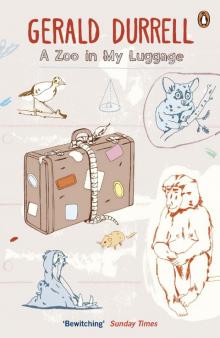 A Zoo in My Luggage
A Zoo in My Luggage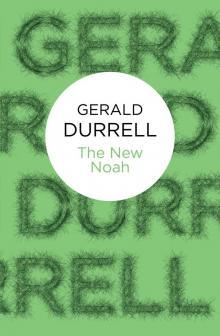 The New Noah
The New Noah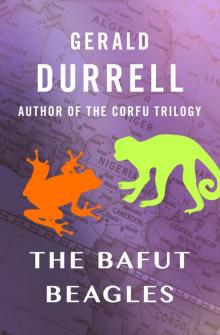 The Bafut Beagles
The Bafut Beagles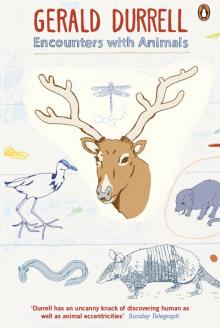 Encounters With Animals
Encounters With Animals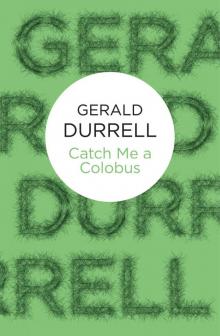 Catch Me a Colobus
Catch Me a Colobus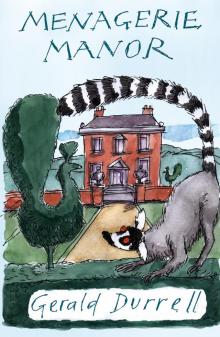 Menagerie Manor
Menagerie Manor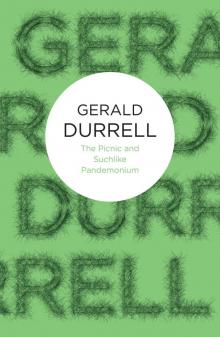 The Picnic and Suchlike Pandemonium
The Picnic and Suchlike Pandemonium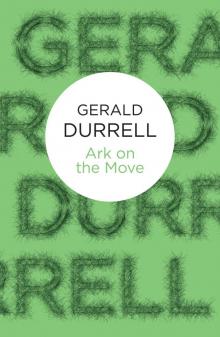 Ark on the Move
Ark on the Move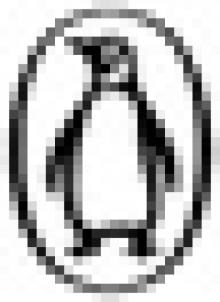 My Family and Other Animals
My Family and Other Animals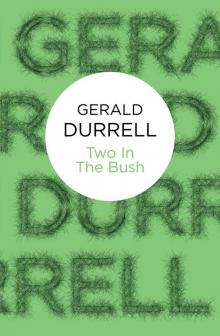 Two in the Bush (Bello)
Two in the Bush (Bello) The Stationary Ark
The Stationary Ark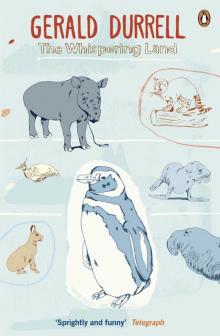 The Whispering Land
The Whispering Land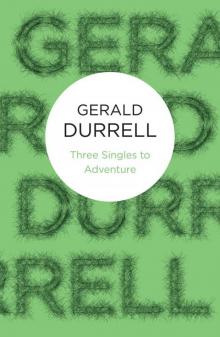 Three Singles to Adventure
Three Singles to Adventure Fillets of Plaice
Fillets of Plaice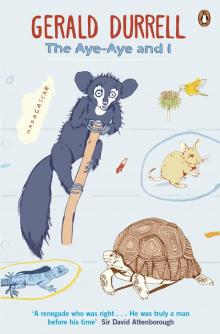 The Aye-Aye and I
The Aye-Aye and I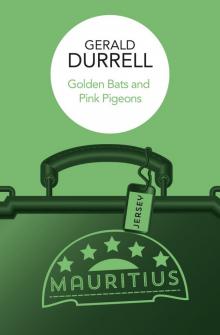 Golden Bats & Pink Pigeons
Golden Bats & Pink Pigeons The Drunken Forest
The Drunken Forest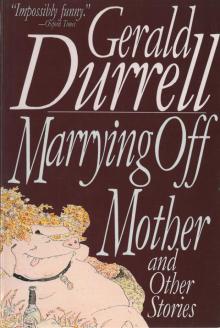 Marrying Off Mother: And Other Stories
Marrying Off Mother: And Other Stories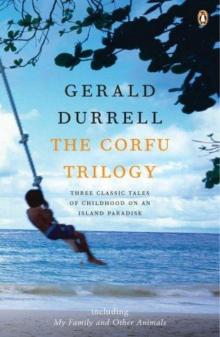 The Corfu Trilogy (the corfu trilogy)
The Corfu Trilogy (the corfu trilogy)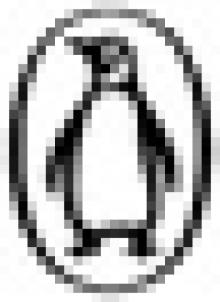 The Corfu Trilogy
The Corfu Trilogy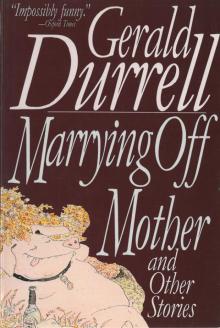 Marrying Off Mother
Marrying Off Mother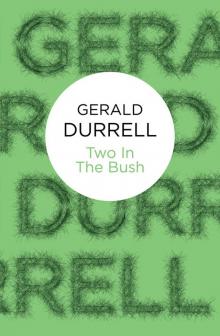 Two in the Bush
Two in the Bush